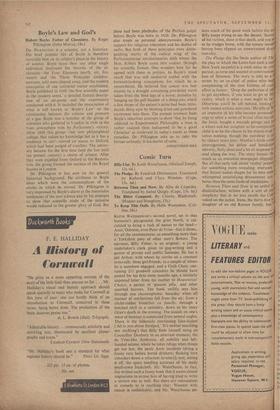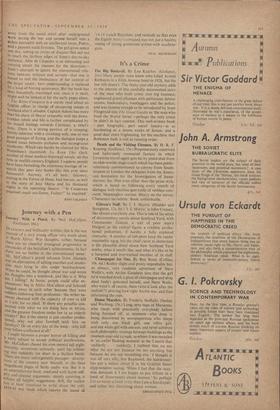Comic Turn
Between Then and Now. By Alba de Uspedes.
Translated by Isabel Quigly. (Cape, I3s. 6d.) The Bitter Conquest. By Charity Blackstock.
(Hodder and Stoughton, 15s.)
To Keep This Oath. By Hebe Weenolsen. (Col- lins, 18s.) KEITH WATERHOUSE'S. second novel, set in that humorist's playground, the grim North, is cal- culated to bring a rush of names to the head- Amis, Osborne, even Peter de Vries—but it shows, for all the reminiscences, as something more than a Yorkshire posy of other men's flowers. The narrator, Billy Fisher, is an original: a young undertaker's clerk given to gag-writing and a gamut of private and public fantasies. He has a pal Arthur, with whom he carries on a constant cross-talk; three girl-friends, to a couple of whom he is somehow engaged; and a Guilt Chest, con- taining 211 goodwill calendars he should have posted for his firm some months ago, a similarly unposted letter from his mother to Housewives' Choice, a packet of 'passion pills,' and other assorted horrors. The book swiftly sees him through one claustrophobic Saturday when all manner of retributions fall from the air; from a cliche-ridden breakfast en famille, through a botched idyll in a cemetery, down to his nasty Gran's death in the evening. The assault on one's sense of humour is conducted from several angles. There is the hideously convincing fake-dialect ('Ah'm just about thraiped,"It's neither muckling nor mickling') that Billy finds himself using on Councillor Duxbury in an aberrant moment; the de Vries-like Ambrosia, all nobility and left- handed salutes, where he takes refuge when things get too hot; the panic Antis incidents (doing a funny turn before bored drinkers; flushing torn calendars down a reluctant lavatory); and, setting it off, the spare needling accuracy of his seedy small-town backcloth. Mr. Waterhouse, in fact, has written such a funny book that it seems almost ungracious to accuse him of having tried to write a serious one as well. But there are conventions in comedy as in anything else: Wooster with cancer is unthinkable; and Mr. Waterhouse un-
does much of his good work before the ei1 Billy keeps trying to see the decent, 'human
of his victims, there is that death, and you all as he trudges home, with the uneasy sensa0 having been slipped an unwarranted drat]; morality.
The Pledge (by the Swiss author of The the play in which the Lunts had such a sue New York recently) is a stark essay in cri pursuit, as terse and assured in construction best of Simenon. The story is told to a 0 writer by an ex-chief of police who beg complaining of the neat falsities of catl0 effect in fiction : 'Drop the perfection if yon to get anywhere, if you want to get at this reality, which is what a man ought to be Otherwise you'll be left behind, fooling 31 with useless stylistic exercises.' He tells of hls an inspector of his who became possessed t'• urge to solve a series of brutal child murde • the force. bought a wayside garage and in a whore and her daughter as his companion` child is to be the cheese in his mouse-trap• solves nothing, though the murderer is tin by chance years later. Matthai's futile coin interrogations, his defeat and breakdo' cleverly, flatly done and a lot of suspense is ated along the way. The story haunts the much as an evocative newspaper clipping But all that early talk about 'reality' prepay` for something more revealing; everyone that fiction makes shapes for its own ends whimpered unsatisfying denouement can better than the most facile of resolutions.
Between Then and Now is an artful 51 dissatisfaction, written with a sort of e% simplicity that in no way recalls the Cole yoked on the jacket. Irene, the thirty-five-1' daughter of an old Roman family, has I' away from the social whirl after underground Work during the war and turned herself into a ttedate journalist with an intellectual lover, Pietro, and a peasant maid.Errninia. The girl gives notice one day, setting up circles of disquiet that sail out to touch the farthest edges of Irene's day-to-day existence. Alba de Cespedes is so interesting and cunning about the reasons for the desertion- Irene's attempts to ignore the conventional rela- tions between mistress and servant--that one is bound to feel the inadequacy of her control of the larger issues : here understanding is replaced by a kind of hinting quiescence. But the book has been beautifully translated and, since it is short, might well be looked at for the early pages alone. ,The Bitter Conquest is a sturdy read about an English officer in charge of occupying troops in Scotland after Culloden. Captain Adams has more than his share of liberal sympathy with the down- trodden rebels and life is further complicated by his mixed feelings towards Christian, a rebel's doxy. There is a strong portrait of a creeping, bawdy informer with a ravishing wife, one or two good passages of Ilyting, and the dialogue keeps a decent mean between archaism and incongruous modernity. Which can hardly be claimed for Miss Weenolsen's mammoth To Keep This Oath. another of those medical-historical novels, set this time in twelfth-century England. I suppose people have been:bewailing the enormous wastage of re- search that goes into books like this ever since U/au/min). Anyway, it's all here : falconry, mining in the Forest of Dean, had barons, as well as the story of Jesu Maria and his thousand nights in the operating theatre. "Is Caesarean practised much out-forest, Father?" he inquired.'
JOHN COLEMAN



































 Previous page
Previous page